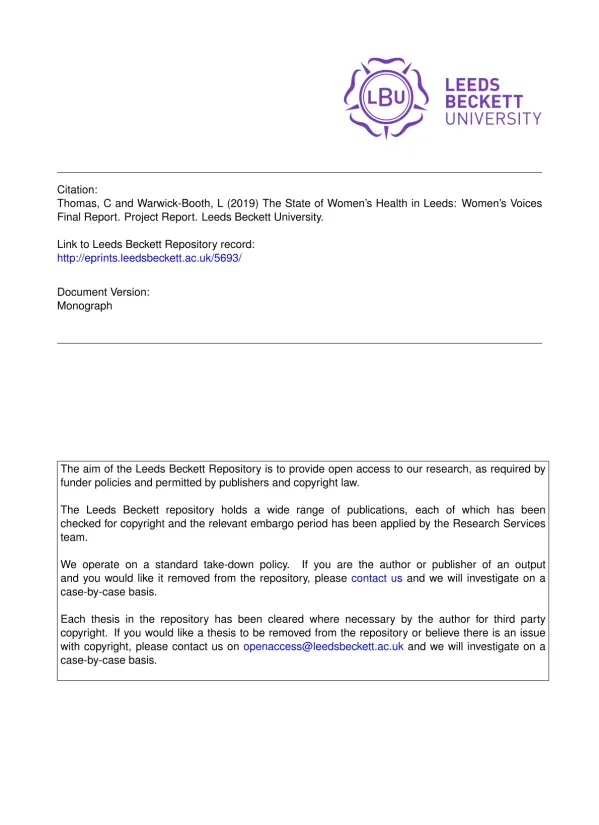
The State of Women’s Health in Leeds: Insights and Recommendations
Document information
| Author | Camille Thomas |
| School | Leeds Beckett University |
| Year of publication | 2019 |
| Place | Leeds |
| Document type | project report |
| Language | English |
| Number of pages | 42 |
| Format | |
| Size | 1.45 MB |
- Women's Health
- Social Determinants of Health
- Intersectionality
Summary
I. Introduction
The report titled The State of Women’s Health in Leeds: Insights and Recommendations provides a comprehensive overview of the health challenges faced by women in Leeds. It emphasizes the importance of understanding the social determinants of health that significantly impact women's well-being. The document highlights that women's health needs are often shaped by their roles in society, including caring responsibilities and experiences of domestic violence. These factors contribute to the high expectations placed on women, which can adversely affect their health. The report advocates for a strengths-based approach to healthcare, recognizing the unique experiences of women, particularly those from marginalized communities. This approach is essential for developing effective health services that cater to the diverse needs of women in Leeds.
II. Key Messages
The report identifies several key messages regarding women's health. It stresses the need for healthcare services to be inclusive and sensitive to the diverse identities of women, including LGBT+ individuals and those from BME communities. The intersectionality of women's experiences is crucial, as factors such as race and gender can compound health challenges. The report notes that many women feel stigmatized regarding their reproductive health, indicating a significant gap in education and awareness. Furthermore, it highlights the necessity for better communication and respect in healthcare settings, as many women report feeling dehumanized during their interactions with health services. Addressing these issues is vital for improving women's health outcomes in Leeds.
III. Recommendations for Improvement
The report outlines actionable recommendations aimed at enhancing women's health services. It calls for improved communication strategies, ensuring that information is accessible in various languages and formats. Additionally, it emphasizes the need for targeted campaigns to raise awareness about women's health issues. The report advocates for a person-centred approach in service provision, which considers the holistic needs of women. This includes recognizing the diversity within the LGBT+ community and tailoring support accordingly. Furthermore, the report suggests mandatory training for healthcare staff on the specific needs of marginalized groups, which is essential for fostering an inclusive healthcare environment. These recommendations are designed to create a more equitable health system for women in Leeds.
IV. Addressing Specific Health Issues
The report delves into specific health issues affecting women, such as menopause, diet, and cancer awareness. It highlights the need for increased public service provision related to menopause, including peer support initiatives. A public health campaign is recommended to reduce stigma and raise awareness of menopause-related health impacts. In terms of diet, the report suggests limiting the number of licenses for fast food outlets to promote healthier eating habits. Additionally, it calls for improved education regarding cancer symptoms, particularly within BME communities, to enhance early detection and treatment. These targeted interventions are crucial for addressing the unique health challenges faced by women in Leeds.
V. Conclusion
In conclusion, The State of Women’s Health in Leeds: Insights and Recommendations serves as a vital resource for understanding and addressing the health needs of women in the region. The report's emphasis on the social determinants of health, intersectionality, and the necessity for inclusive healthcare practices underscores the complexity of women's health issues. By implementing the recommendations outlined in the report, stakeholders can work towards creating a more equitable and responsive health system that acknowledges and addresses the diverse needs of women. The insights provided in this document are not only relevant to Leeds but can also inform broader discussions on women's health across different contexts.
Document reference
- The State of Women’s Health in Leeds: Women’s Voices Final Report (Camille Thomas, Louise Warwick-Booth)
- NHS campaign on Bowel Cancer
- Research into the menopause
- Education about the signs and symptoms of cancers
- Public Health campaign on menopause
